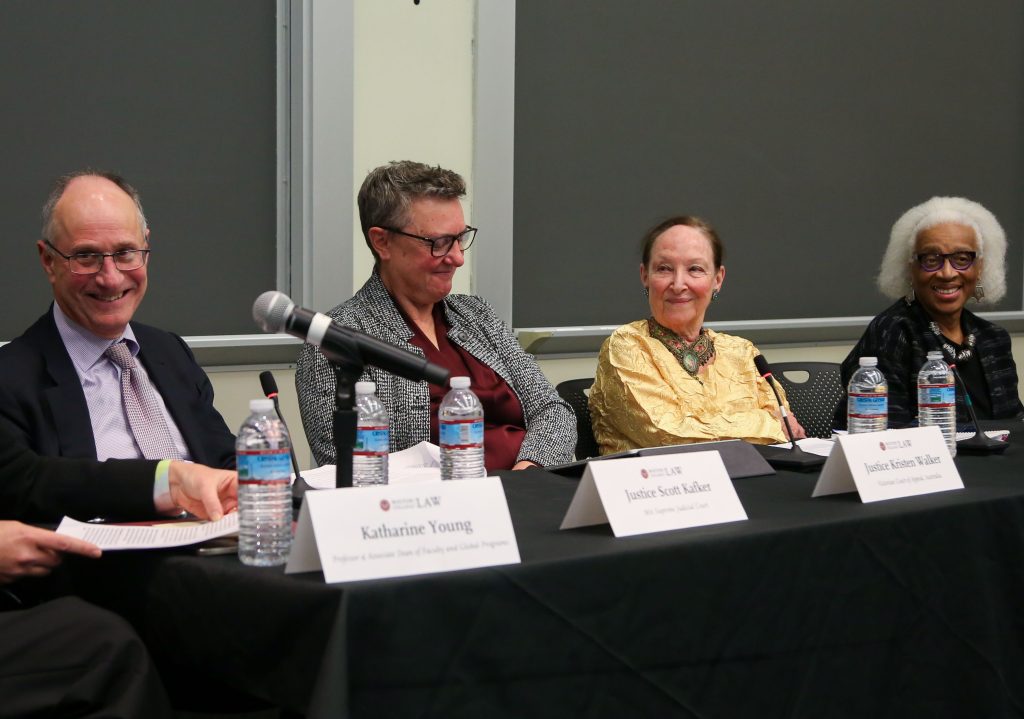In a backsliding trend noted by many commentators, many of the decisions of the current US Supreme Court have curtailed federal rights that were once considered constitutionally protected. The controversial Dobbs decision, maligned by critics as an unprecedented attack on individual liberties, ignited a growing movement to enshrine abortion rights in state constitutions. Today, some state courts are exercising their authority to interpret—and protect—state constitutional rights independent of federal rights at previously unforeseen levels.
To discuss this ongoing shift in judicial federalism, the Boston College Law School’s Global Programs, and the Boston College Clough Center for the Study of Constitutional Democracy brought a panel of distinguished judges from around the world to the BC Law campus November 14 to discuss the authority that state courts have to experiment with, and defend, individual rights. Justice Geraldine Hines, a distinguished visiting professor at BC Law and former justice of the Massachusetts Supreme Judicial Court (SJC), was joined by Justice Scott Kafker, associate justice of the SJC; Justice Kristen Walker of the Victoria Court of Appeal in Australia; and Justice Rosalie Abella, formerly of the Supreme Court of Canada. Their conversation was moderated by Professor Katharine Young, associate dean of faculty and global programs at BC Law.
The international focus of the panel was intended to provide competing visions of federal judicial power. Canada, for instance, only adopted a constitutional bill of rights in 1982 when the Canadian Charter of Human Rights and Freedoms enshrined certain civil and political rights and equality rights at the constitutional level (previously, the Canadian Bill of Rights served only as a federal statute without application at the provincial level). The Canadian judiciary’s power to protect these rights via judicial review of provincial courts was vastly expanded.
Justice Abella was candid about the differences between the US and Canadian judiciaries: “Since we were first granted these rights, we have been on an increasing trajectory toward ever-expanding rights … we never shrink. It’s not [the judiciary’s] job in a democracy to shrink civil rights.”
But even within the realm of Commonwealth countries, the Australian concept of federalism seems alien from the Canadian model, according to Justice Walker. “The ability of a state court to see itself as some kind of independent protector of rights … It’s not how we conceive of ourselves. As a judiciary, [the state courts] deal with criminal law issues, state government decisions, and general dispute resolution. We act impartially in those areas, but our scope is fairly limited otherwise.”
Unlike the United States Supreme Court, which has come under scrutiny in recent years for its increasingly partisan nature, the Canadian Supreme Court has largely avoided the appearance of impropriety. “The United States is locked in a contested battle over the meaning of what a democracy is,” Justice Abella lamented. “It’s become all about majoritarianism, and not about checks and balances and the right to dissent. In every other court in the western world, it’s not just about the majority; it’s how you treat the rights of those not in the majority.”
Traditionally, it was the province of the legislature to respond to majoritarian impulses; if a majority of the public supported a change in the law, they could voice that opinion at the ballot box in Canada. This system was kept in check by a judiciary established to hear—and protect—minority rights. “We’re the only institution in a position to risk the possibility of controversy [without fear of electoral backlash] … We live for that,” Justice Abella said. In her opinion, the US Supreme Court has used their lack of public accountability to actively harm minority rights in this country.
Justice Hines mourned a time when the nation’s highest court sat above partisan bickering. “I see the dangerous and brazen politicization of the Supreme Court, and that has left me with the firm conviction that we cannot rely on the Supreme Court to protect and preserve our liberties,” she said. But she also offered a glimmer of hope, adding that, “State Supreme Courts have stepped into the breach on many occasions, to chart an individual path …We need to get over our undeserved and unrequited love for the Supreme Court.”
Justice Kafker echoed those sentiments, expressing his bolstered pride in serving on the Massachusetts Supreme Judicial Court. “We’re really starting to do our own thing, and getting out of the shadow of the US Supreme Court,” he said. And he doesn’t see that trend ending anytime soon. “The more the US Supreme Court continues on this path, the more you’re going to see creative work on the stateside.”
Photograph by Reba Saldanha


